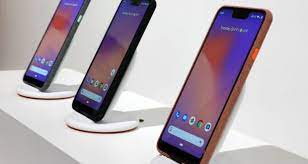Does Google charge phone makers for Android: Google is changing the way it licenses its suite of Android apps in Europe, leading the company to charge a licensing fee for the Play Store and other Google apps for the first time.
Tech mistake | The changes come in response to a July ruling by the European Commission, which fined the company $5 billion for antitrust violations and ordered it to stop “illegally tying” Chrome and search apps to Android.
Google hasn’t historically charged for Android and its apps because of the revenue brought in through Chrome and search. But splitting them up changes the equation, so companies will now find themselves paying for things — like the Play Store — that we generally consider being core parts of Android, but are in reality Google services.
The base Android operating system will remain free and open-source, but if phone and tablet manufacturers want Google’s apps and the Play Store, they’ll have to pay a license fee in Europe. And they’ll now be able to license Chrome and search separately, rather than being required to accept everything as a bundle.
To break it down:
- Android, more formally known as AOSP, or Android Open Source Project, is free.
- The Play Store and many of Google’s other apps, like Gmail, Google Maps, and YouTube, will be bundled together under a paid licensing agreement.
- Chrome, in a bundle with the Google Search app, can be added on top of that agreement for free, but it isn’t required.
It is not yet clear how much the fees will be. But one way or another, device makers have to pay if they want any of these Google services.
Device makers have three options here: make a phone without the Play Store or any other Google apps; make a phone with the Play Store and all Google apps but Chrome and search; and make a phone with all those apps, like most Android phones that ship today. It’s really only that middle option that’s new — but it’s a big deal for Google, which could lose a huge revenue stream, and for competing browser and search engines, which have an opportunity to get key placement on devices in their stead.
“GOOGLE SEARCH AND CHROME … HELPED US FUND THE DEVELOPMENT AND FREE DISTRIBUTION OF ANDROID.”
“Since the pre-installation of Google Search and Chrome together with our other apps helped us fund the development and free distribution of Android, we will introduce a new paid licensing agreement for smartphones and tablets shipped into the [European Economic Area],” writes Hiroshi Lockheimer, who leads Android.
There is one other key change happening here.
In the past, Google required that companies building phones or tablets that included the Play Store only build phones and tablets that included the Play Store — they couldn’t make other devices with a forked version of Android. Now, that’ll be allowed. So if Samsung wants to ship both the regular Galaxy S9 with Google’s Play Store and some whackadoo Galaxy phone that runs, say, Amazon’s Fire OS, it can now do that in Europe.
Lockheimer clarifies that Android more broadly will remain free and open source. These changes only affect the Google products that are traditionally bundled with the OS. If companies don’t want to pay, they can still ship a device without any of Google’s apps and services, as Amazon has long done and as already happens in China, where Google doesn’t operate.
But the Play Store is likely to keep phone and tablet makers attached to Google since it’s where users can access the vast majority of Android apps.
And since there is no way to get the Play Store and Google’s apps in Europe without paying the license fee anymore, it’s likely that cost will be passed on to consumers in the form of higher device prices.
That said, Google is appealing the European Commission’s ruling. Ultimately, it doesn’t want to have to split up Android, Chrome, and search. But for the time being, it has to comply with the commission’s decision, and it’s going to put these changes into place starting October 29th.
A spokesperson for the European Commission said that Google isn’t required to charge for its apps or the Play Store and that it’s Google’s responsibility to change its policies in a way that complies with the ruling. “The Commission will closely monitor Google’s compliance to ensure that the remedy is effective and respects the decision,” the spokesperson said. They added that the decision is meant to allow other browsers and search engines to “compete on the merits with Google for pre-installation on Android devices.”
Update, 2:05 PM ET: Added details around Google’s licensing terms for the Play Store and apps.
Correction and update, 4:33 PM ET: Corrected and clarified licensing terms for the Play Store and apps. The article previously stated that Chrome and search could be included without licensing the Play Store; they cannot. They do not include a licensing fee, either. The article also stated that Google apps could be installed on forked versions of Android; that was incorrect — instead, manufacturers are allowed to sell separate forked devices.
The article was originally published here.
To get more knowledge about Does Google charge phone makers for Android? Please visit our site: www.techmistake.com
